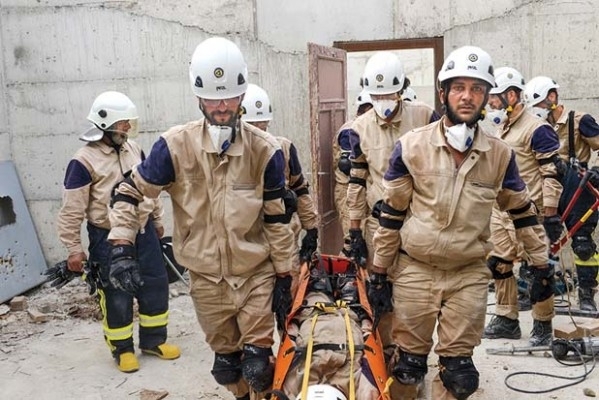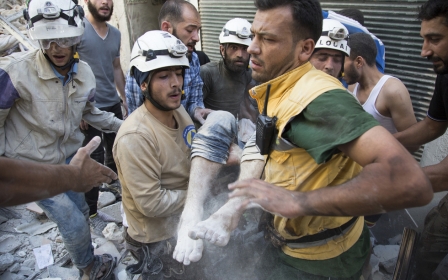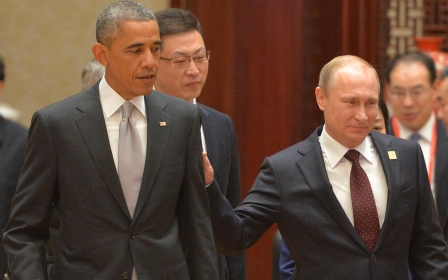Why the White Helmets also deserved the Nobel

Today, the Norwegian Nobel Committee announced that the Nobel Peace Prize for 2016 was awarded to Colombian President Juan Manuel Santos for “his resolute efforts to bring the country’s more than 50-year-long civil war to an end.”
They embody a spirit of unstoppable civic resistance and, unlike the international community, exemplify solidarity
While Santos undoubtedly deserves to be awarded the Nobel Peace Prize for his tireless determination to achieve a peace deal with the Revolutionary Armed Forces of Colombia (FARC) guerilla group, so did the Syrian Civil Defence (SCD), an organisation commonly known as The White Helmets, for the tireless determination of its volunteers to save as many people as possible.
Inspired by the 32nd verse of chapter five of the Quran, which states that “to save a life is to save all of humanity,” SCD volunteers have rescued more than 60,000 people in opposition-controlled areas in Syria, one of the targets of the Syrian regime led by President Bashar al-Assad.
Who are the White Helmets?
In late 2012 and early 2013, groups of civilian volunteers established first-responder centres in opposition-controlled areas in Syria, including Aleppo, Douma, and al-Bab, with the objective of providing a coordinated search-and-rescue response to Syrian communities under regime attack.
These groups of civilian volunteers were composed of bakers, tailors, engineers, pharmacists, painters, carpenters, students and others who shared a common mission: to save the maximum number of people.
According to its Interim Articles of Association, the SCD is a non-profit, non-partisan organisation: “The SCD provides services to citizens equally and on a volunteer basis for no profit, share of profits or interest to any of its members or any specific person directly or indirectly; or to achieve any political goals that are part of any agenda of any political party or armed groups; or to achieve sectarian goals.”
Unsurprisingly, supporters of the regime led by Syrian President Bashar al-Assad – and Assad himself – have attempted to delegitimise the SCD’s non-partisan character. They have accused the SCD of being a politicised organisation, arguing that the SCD receives funding from several Western governments.
Since 2013, the SCD counts on the support of Mayday Rescue and Chemonics, two Western-based organisations that implement international aid programmes. Through these organisations, the SCD receives funding from the governments of the UK, The Netherlands, Denmark, Germany, Japan, and the US. This funding, more than $40m to date, is used to cover the costs of training, equipment, advocacy and organisational capacity building.
Also, the SCD receives individual donations to cover these costs, and to their Hero Fund, which helps injured volunteers through their recovery, and the families of those volunteers who have been killed while on duty.
Until now, over 140 volunteers have been killed whilst saving lives. Among these heroes is Khaled Omar, the former painter and decorator who, in July 2014, rescued “the miracle baby,” also known as “little Mahmoud,” from the remains of a three-story building in the city of Aleppo.
“For me, this is the real jihad. If I die saving lives, I think God would definitely consider me a martyr,” he stated in a Vocativ interview in late 2014. A year and a half later, on 11 August 2016, Omar died in an air strike, leaving a widow and two daughters.
What do they do exactly?
Initially, SCD volunteers only conducted search and rescue operations. They did so with no prior training nor safety equipment, using mattocks, shovels and other simple tools.
In early 2013, however, through the Mayday Rescue organisation, SCD volunteers trained at the Turkish Search and Rescue Institute learning simple search and rescue methods, and how to support fragile roofs, cut rebar, and use drills and motor-powered manual diggers to ascertain the presence of survivors or casualties.
A more advanced course followed, in which SCD volunteers were taught how to use heavy tools and ropes, and how to lift roofs using airbags. Also, first responders received specialised medical training.
Since then, SCD volunteers also conduct firefighting operations and large-scale evacuations of civilians, and respond to poison or chemical gas attacks.
Now, SCD volunteers are working on preparing shelters and installing a comprehensive warning system to warn civilians of imminent attacks.
In addition, SCD volunteers provide vital community services, particularly in areas where there is no local council. Their tasks include fixing electricity cables, water supply pipelines, and maintenance of public infrastructure.
Their daily work is featured in the 41-minute Netflix documentary The White Helmets which, set in Aleppo, Syria, and in the Syrian-Turkish border in early 2016, provides a first-hand look into the work of the organisation from the perspective of three of its members.
“Any human being, no matter who they are or which side they are on, if they need our help, it is our duty to save them,” says Abu Omar, an SCD volunteer, in the film.
“I thought it is better to do humanitarian work than to be armed. Better to rescue a soul than to take one,” SCD volunteer Mohammad Farah explains later.
“All lives are precious and valuable; a child, even if he is not my son, is like my son.”
The documentary captures their heroic efforts in the crossfire of air strikes, as well as the reality of thousands of Syrians living under siege and constant bombardment: families using social media to learn of the deaths of their loved ones, a child who recognises the lifeless body of his father, and people watching the sky, waiting for the next attack.
Why did they deserve the Nobel?
Earlier this week, the US Department of State announced that the US was suspending its participation in the bilateral channels with Russia that were established to sustain a ceasefire in Syria.
“Russia has failed to live up to its own commitments – including its obligations under international humanitarian law and UNSCR 2254 – and was also either unwilling or unable to ensure Syrian regime adherence to the arrangements to which Moscow agreed," the State Department said.
Amid the lack of further action of the international community, the Syrian regime has intensified its aerial campaign against opposition-controlled areas in the city of Aleppo.
According to a recent report from the Britain-based The Syrian Observatory for Human Rights, more than 500 people have been killed in aerial bombardment since the collapse of the US-Russian ceasefire agreement on 19 September.
In total, more than 9,000 people, including more than 3,800 civilians, have died in Russian air strikes since Russia launched its air campaign in support of the Assad regime.
With no political solution on the horizon but aircraft launching constant attacks, SCD volunteers offer a sentiment of pure compassion for their people. They embody a spirit of unstoppable civic resistance – upholding some of the ideals of the 2011 uprising – and, unlike the international community, exemplify solidarity.
For their humanity, The White Helmets also deserved to win the Nobel Peace Prize, and the international recognition it entitles.
- Tania Ildefonso Ocampos is a Spanish political analyst who specialises in EU strategy in the Middle East. She is a former Schuman trainee (Euro-Med and Middle East Unit of the European Parliament's Directorate-General for External Policies), and holds an MA in Middle Eastern History from Tel Aviv University, Israel.
The views expressed in this article belong to the author and do not necessarily reflect the editorial policy of Middle East Eye.
Photo: The Syrian Civil Defence Force, otherwise known as White Helmets, search for survivors amid rubble in Idlib after Russian air strike (AFP)
This article is available in French on Middle East Eye French edition.
Stay informed with MEE's newsletters
Sign up to get the latest alerts, insights and analysis, starting with Turkey Unpacked
Middle East Eye delivers independent and unrivalled coverage and analysis of the Middle East, North Africa and beyond. To learn more about republishing this content and the associated fees, please fill out this form. More about MEE can be found here.






